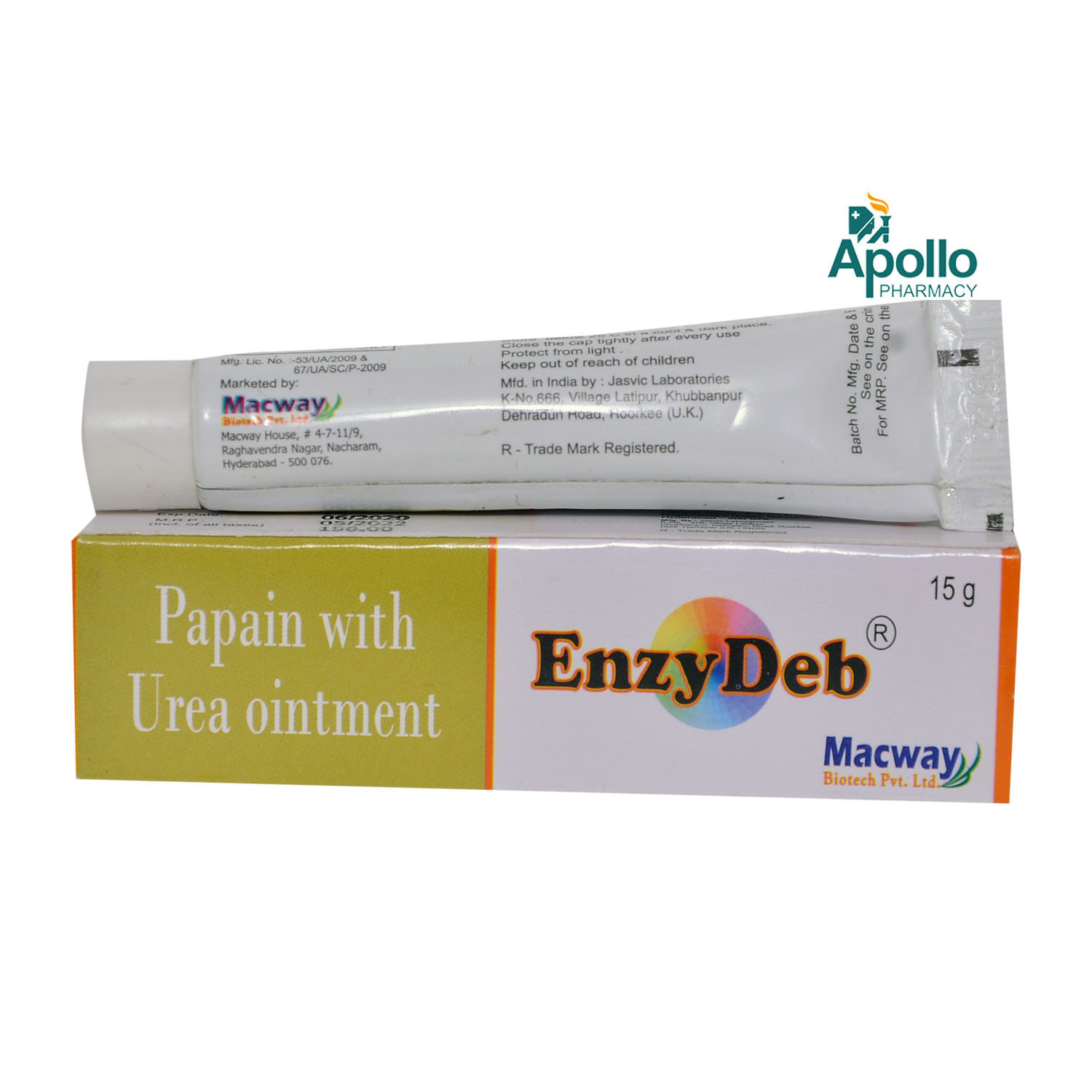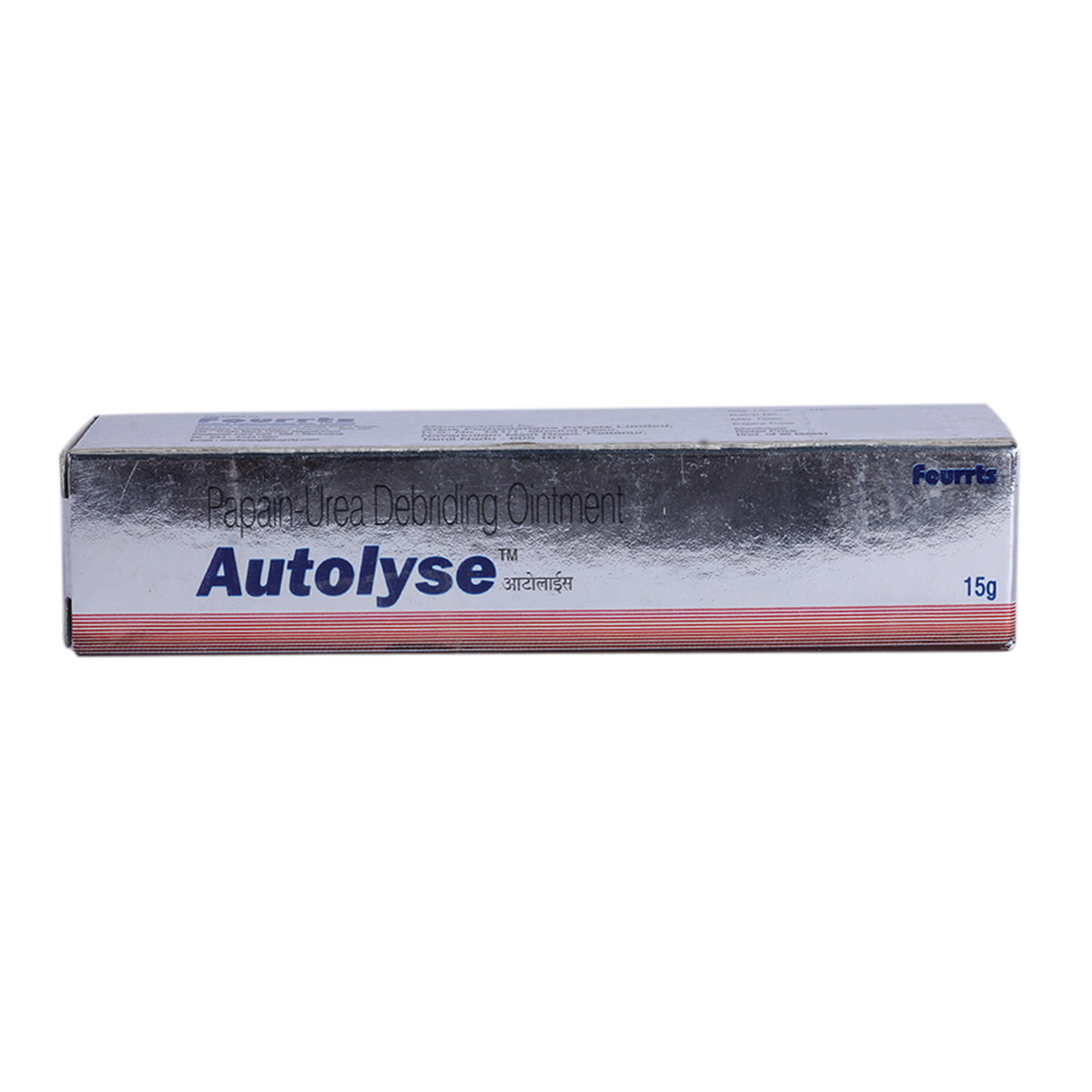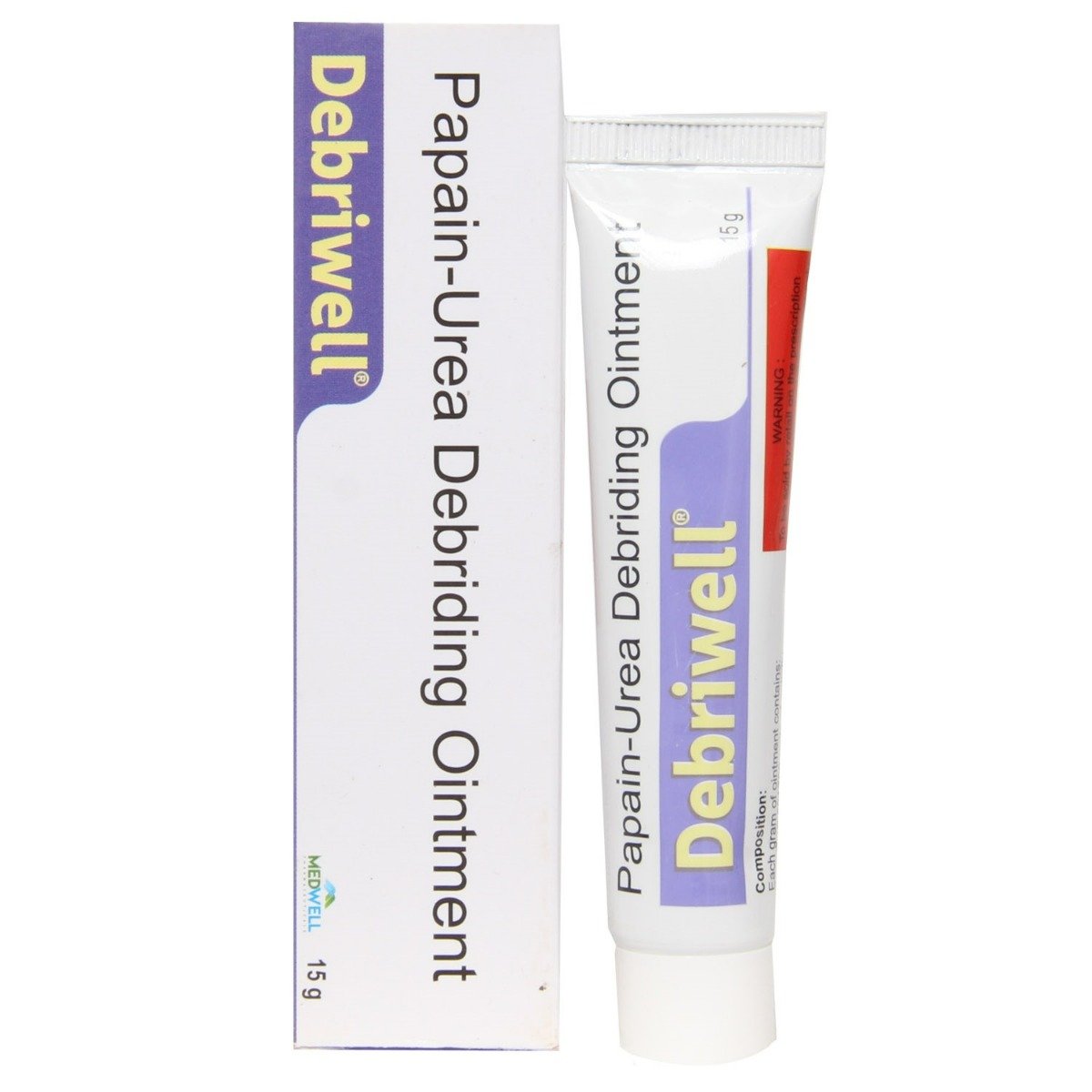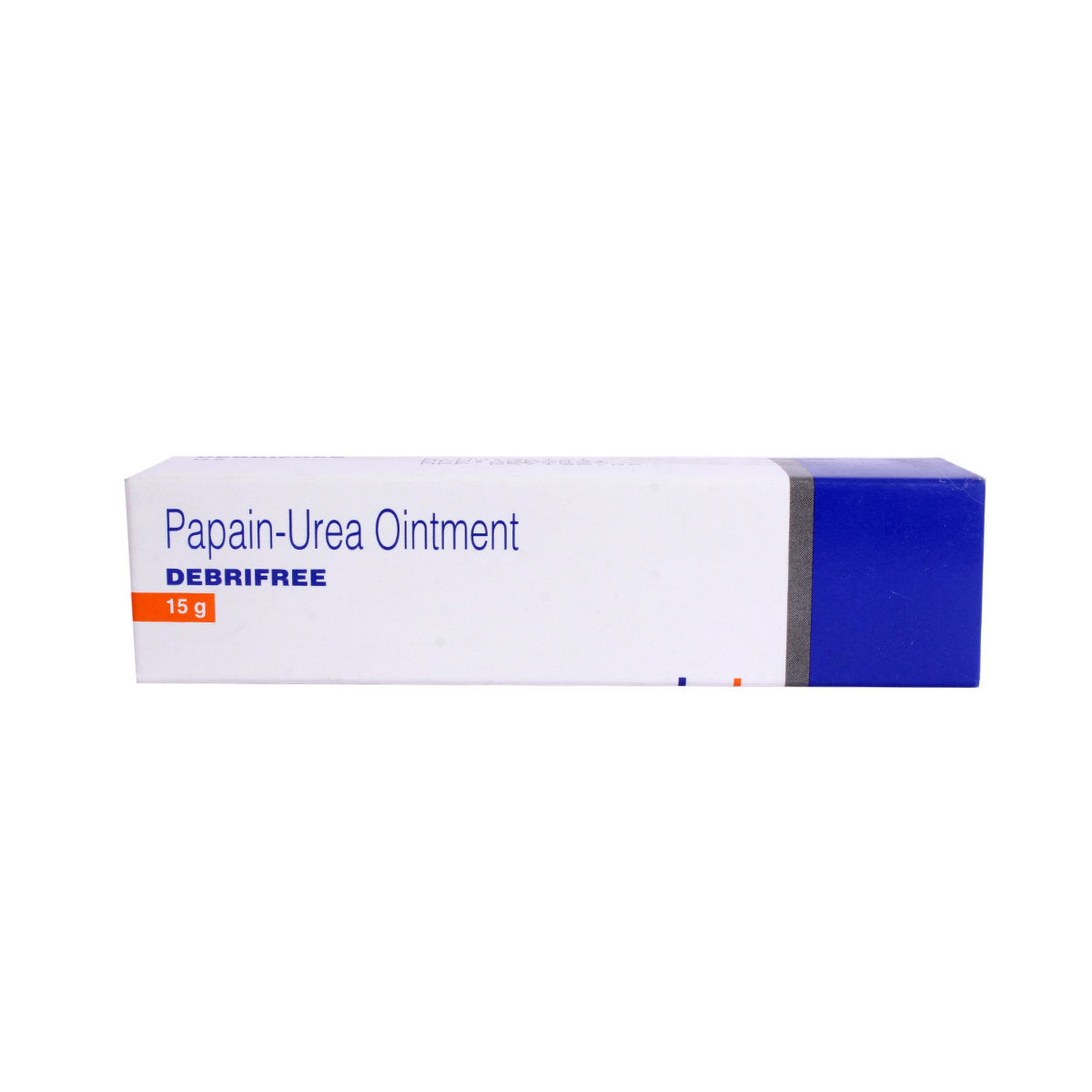Papain+urea
About Papain+urea
Papain+urea belongs to the class of medications called 'Debridement agents' used to remove dead skin, thereby improving healing. It also helps thin the pus in lesions (ulcers, cysts, bedsores, surgical wounds).
Papain+urea contains Papain and Urea. These two medicines are keratolytic agents, increase moisture in the skin, and dissolve the keratin (protein present on the skin's outer layer). This effect makes dead skin cells fall off and accelerate healing. It also has an emollient effect and helps to soften the skin.
You should use this medicine exactly as prescribed by the doctor. The common side effects of Papain+urea are a burning sensation, itching, and irritation in the treated area. These side effects are usually mild and temporary. However, if these side effects persist or worsen, inform your doctor immediately.
It is not recommended to take Papain+urea if you are allergic to any contents of it. Before taking Papain+urea, inform your doctor if you have liver or kidney disease and poor blood circulation. Do not use this medication on skin cuts, infections, or sores. Papain+urea should be used with caution in pregnant women, breastfeeding mothers, and older people. It is not recommended for use in children less than two years. Papain+urea may not interact with alcohol and may not affect your driving ability.
Uses of Papain+urea
Medicinal Benefits
Papain+urea belongs to the class of medications called 'Debridement agents' used to remove dead skin and promote wound healing. Papain+urea contains Papain and Urea, which help remove dead skin from wounds and speed up recovery. It also helps thin the pus in lesions (ulcers, cysts, bedsores, surgical wounds). These two medicines increase moisture in the skin and dissolve keratin (a protein on the skin's outer layer). This effect makes dead skin cells fall off and accelerate healing. It also has an emollient effect and helps to soften the skin.
Directions for Use
Storage
Side Effects of Papain+urea
- Burning sensation
- Itching of treated skin
- Skin irritation
Drug Warnings
Papain+urea is for topical (skin) use only. Do not use the medicine in and around your eyes. If the medicine accidentally gets into your eyes, nose, mouth, or genitals, rinse it with water thoroughly. It should not be given to children with a fever, especially if they have flu symptoms or chickenpox. Papain+urea may increase skin sensitivity to the sun, so take necessary precautions while going outside and avoid tanning beds or sunlamps. If you notice any persistent skin irritation or worsening of the skin disease, stop using Papain+urea and immediately inform your doctor.
Drug Interactions
Drug-Drug Interactions: Papain+urea is known to interact with other topical medicines containing hydrogen peroxide, silver nitrate, silver sulfadiazine, silver, mercury, lead, and thimerosal.
Drug-Food Interactions: No interactions found.
Drug-Disease Interactions: Papain+urea should be used with caution in patients with liver or kidney diseases and poor blood circulation.
Drug-Drug Interactions Checker List:
Safety Advice

Alcohol
safe if prescribedPapain+urea may not interact with alcohol.

Pregnancy
cautionPapain+urea contains urea, a Category C pregnancy drug that may cause harmful effects on the unborn baby. So, it is given to a pregnant woman only if the doctor thinks the benefits outweigh the risks.

Breast Feeding
cautionIt is not known whether Papain+urea can pass into breast milk. So, it is given to a breastfeeding mother only if the doctor thinks the benefits outweigh the risks.

Driving
safe if prescribedPapain+urea may not affect your ability to drive.

Liver
cautionPapain+urea should be used with caution in patients with liver diseases. The dose may have to be adjusted by your doctor.

Kidney
cautionPapain+urea should be used with caution in patients with kidney diseases. The dose may have to be adjusted by your doctor.

Children
cautionPapain+urea is not recommended for children below two years. In children above two years, it is given only if the doctor thinks the benefits outweigh the risks.
Habit Forming
Diet & Lifestyle Advise
- Use mild soap while taking baths and prefer warm baths.
- Avoid harsh products on your skin.
- Do not scratch or pick your skin to avoid infecting the affected area.
- Manage stress, eat healthily, drink plenty of water, exercise regularly, and get plenty of sleep.
- Limit food intake that might trigger allergies, such as dairy products, soy, eggs, and nuts.
- Avoid consuming foods with excess sugar, as it may flare up inflammation.
- Include fruits, vegetables, whole grains, healthy fats, and fish.
- Avoid getting in contact with harsh soaps, detergents, and rough fabrics.
- Wear clothes with long sleeves, a hat, and sunscreen with high SPF while outdoors.
- Avoid tanning booths and sunlamps.
Special Advise
- Before applying Papain+urea, avoid using hydrogen peroxide to clean your wound, as it might affect the effectiveness of Papain+urea.
- If there is no improvement in your condition after 4-6 weeks of treatment with Papain+urea, consult your dermatologist.
Patients Concern
Disease/Condition Glossary
Debridement: It is a procedure for treating wounded skin. These agents help to remove dead skin and tissues from wounds, including ulcers, cysts, bedsores, and surgical wounds. Sometimes, it is also used to remove foreign material from tissues. It also helps to speed up the healing process of wounds.
FAQs
Papain+urea contains Papain and Urea. These two medicines are keratolytic agents (soften, separate, and peel off the horny layer of skin). They dissolve the keratin (protein present on the outer layer of skin), remove dead skin cells, and soften the skin.
The common side effects of Papain+urea are a burning sensation, itching, and irritation in the treated area. These side effects are usually mild and temporary. However, if any of these side effects persist or worsen, inform your doctor immediately.
It is advised to avoid using other topical medicines on the affected area while using Papain+urea. So, inform your doctor before using any medications while using the Papain+urea. If the doctor prescribes other skin creams or ointments along with Papain+urea, you should maintain an interval of at least 30 min between the two medications.
Papain+urea should not be used to treat diaper rash or redness. It is not recommended for use in children below 2 years of age.
Papain+urea is for topical use (for skin) only. Do not use the Papain+urea on the skin that is red, swollen, oozing, and infected, and avoid contact with eyes, nose, mouth, and genitals. It can make your skin more sensitive to the harmful effects of sunlight. So, using sunscreen and wearing protective clothing while using Papain+urea is advised. It is recommended to avoid tanning booths and sunlamps. Please do not use it on larger areas and for prolonged periods unless prescribed by the doctor.









